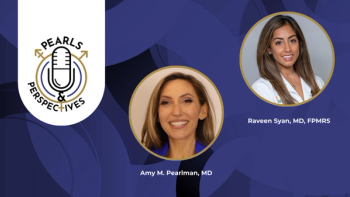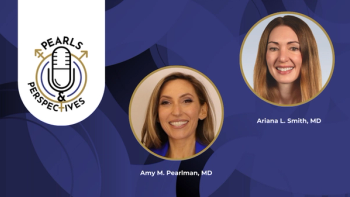
Monitoring, Evaluating, Adjusting OAB Treatment Strategies: Expert Perspectives
Dr. Kennelly, Dr. Kevin Benson, and Dr. Karyn Eilber discuss the goals and assessment methods for overactive bladder (OAB) pharmacological treatments, including how they monitor and address refractory or nonresponsive cases. They explore the real-world rates of medication failure, particularly with anticholinergics, and delve into the decision-making process behind considering alternative therapies, focusing on factors that prompt a change in treatment, especially for specific patient populations. The discussion includes insights on when and why to shift from standard OAB medications to other therapeutic options.
Episodes in this series

Transcript:
Dr. Kennelly: So let's say you start someone on medication therapy, is there a way that you monitor that offered you monitor people or when would you see them back and use any techniques to monitor them?
Dr Eilber: You know, I think that telehealth has really changed the way that I practice and following up with the OAB patients. You know, most of the anticolingerics take at least four weeks to work. And I think a lot of us had this false impression that if it worked, they would call us and we would fill the prescription, or if it didn't work, they would let us know and we could try something else. In reality, if you don't have a follow-up plan, they just kind of fall by the wayside. So for me, I usually set up a telehealth visit, if they're getting like one of the newer beta-3 agonists will set up a telephone phone call in two weeks because they'll see a response that quickly. If they're trying anticholinergic, maybe in four weeks, but it's a great way to capture these patients. If it didn't work, then we'd just call them. Either doing your dynamics or empirically trying other treatments. And I found that's really the best way to follow up with patients these days.
Dr Kennelly: Yeah, I too, in my practice, have noticed that the more that you check in with someone and telehealth is a great way to check in to keep them on track, it's better because the data that we've seen with any therapy, specifically anti-muscarinic therapy, is that, oftentimes within six months people are already off the medicine. And if we don't check in with them, we just assumingly think they're doing well. When in reality they've been off the medicine and they just haven't come back. So Dr. Benson, do you use sort of a telehealth or a check-in or how do you follow patients?
Dr. Benson: Well we really frame the journey with us from the first day that this is a relationship and that we're going to be talking about. to them. And I think that the expectation when we have that first consultation is at a month, we're going to, in one way or another, be in contact, not only check the medicines working, but to really give them a positive thought, we're going to move on to something else if this is not the right solution. And I think that for many of the patients who've already been on these meds or have done other things, they're frustrated. They feel like they're at the end of the road and we're going to do either the same thing or do nothing when they're back. So not only do we have the visit in a month, but we set some expectations for the visit before they leave. And that is, you know, if the medicine's working well, we're going to talk to you about some compliance issues, you know, how we can best get this free at the best cost, etc. But if not, we have a number of other tools in our toolbox and we're going to use those. So everybody's a little bit different when they come into this first journey about how far they've already come. And again, as a referral center, we see people that have already done some of the things. The naive patient to meds might have a little different conversation the person has already used one, but that's really how we would frame it is either through telehealth or person or through a messaging service will be in touch.
Dr. Kennelly: All right, and Dr. Eilber, when patients come in, back and let's say they're doing well or let's say they're not doing well, can you use both of the classes of medicine together or can you double up on a similar class or what is your methodology from sort of pharmacological management?
Dr Eilber: I'm not usually one of those cyclers that just keeps prescribing medication in the same class of drug. I mean, there's nothing to support that, you know, one -inch collars. cholinergic is superior to another. I think it's reasonable to maybe try a different class. I think it's also reasonable to take one medication from each class, but long -term, if it takes two medications for someone to respond, I really try to encourage them to look at a third -line therapy. I mean, if you need two medications, you're probably just need something a little more aggressive. So that's kind of my personal approach to that.
Dr Kennelly: So the term refractory, OAB has been out there. I don't think there's a real definition of what that is. Dr. Benson, do you use that term in your practice, or someone refractor, or the non-responders, or how would you say that?
Dr Benson: Sure, I think on any given day, we use all that terminology. And, you know, again, it's just, it's a journey. And they've not responded well. to the basics. And so my real feeling is based on compliance data, side effect data, cost data, meds are just not for many a long -term great option. And so the philosophy we have in our clinic is we want the patient to get effective, efficient care. As I say to them, we want to do the most for you with while doing the least to you. So that's kind of our magic mantra. And meds just often are not that. So just like Dr. Eilber, I really want to move them on to an advanced therapy unless they're hitting a grand slam with meds. And again, we use both classes generally, but then move on.
Dr Kennelly: Yeah, so I think it was mentioned of the cycling and trying to not to cycle. I think too often that's being done, but there are effective solutions. And at some point if people aren't meeting their goals, we should kind of keep checking in with them to say, where are we at? How much improved are we? But if we're not where they're at, we do have other modalities and treatments, you know, for that.
*Video transcript is AI-generated and reviewed by Urology Times® editorial staff.
Newsletter
Stay current with the latest urology news and practice-changing insights — sign up now for the essential updates every urologist needs.






